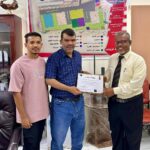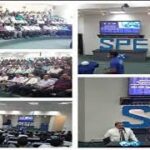Computer Engineering Department
Overview:
Computer Engineering Department was established in the academic year 2005–2006, replacing Computer Science Department, which was originally founded in 1996. The department was later transferred to Science Faculty and subsequently to Computer and Information Technology Faculty.
Computer Engineering Department is distinguished by its laboratory capabilities. It is equipped with labs containing numerous computers installed with specialized software, aimed at preparing students to use essential programs in their field of study. This ensures that graduates are well-prepared to participate effectively in the modern technological era.
The duration of study in the department is five academic years, after which students are awarded a Bachelor’s degree in Computer Engineering upon successful completion of all requirements and examinations. The curriculum includes both fundamental and applied courses in areas such as databases, computer organization, digital electronics, software engineering, computer architecture, microprocessor systems, digital signal processing, artificial intelligence, computer networks, microprocessor interfacing, operating systems, real-time systems, cryptography and network security, parallel processing technologies, and very-large-scale integration (VLSI) circuit design.
The department emphasizes the use of specialized scientific software and integrates theoretical knowledge with practical application through field visits to factories, companies, and institutions, as well as hands-on training in departmental labs and external organizations.
Graduates of the department are qualified to work in computer hardware maintenance, problem analysis from a computational perspective, proposing and implementing efficient algorithms, and designing, modifying, and operating computer-based systems (both hardware and software). They are also capable of conducting research in the field of computer engineering, working in multidisciplinary teams, and understanding the environmental, economic, and social impacts of engineering solutions.
Vision
To achieve leadership and excellence locally and regionally in the field of computer engineering in a way that contributes to community service.
Mission
To prepare distinguished engineers at the local and regional levels to practice the profession of computer engineering, conduct scientific research, keep pace with scientific and professional developments, serve the community, foster creativity and knowledge innovation, and strengthen partnerships with relevant institutions and governmental bodies.
Objectives
- To prepare scientifically and practically qualified engineers in the field of computer engineering.
- To equip students with logical and creative thinking skills, and the ability to design computer systems that address societal problems and meet labor market demands.
- To develop students’ skills in preparing research and professional reports and solving problems in computer engineering to support development and community service.
- To establish a scientific environment conducive to academic work in computer engineering that keeps pace with contemporary developments and addresses emerging challenges.
- To instill professional values and ethics, modern technical skills, communication abilities, and teamwork competencies in students.
Deans of Department:
| Name | Academic Title | Period |
| Dr. Sobhi Hamadi Hamdoon | Associate Professor | 2005-2006 |
| Dr. Faiz Yaslam Ba’athman | Associate Professor | 2006-2007 |
| Dr. Faiz Abdulkarim Bazanbour | Associate Professor | 2007-2008 |
| Dr. Makarem Mohammed Bamatarf | Assistant Professor | 2008-2009 |
| Dr. Saeed Ali Bahaj | Associate Professor | 2009-2014 |
| Dr. Saeed Mohammed Baneimoon | Professor | 2014-2019 |
| Dr. Makarem Mohammed Abdul Bamatarf | Assistant Professor | 2019-Present |
Faculty Members and Their Specializations:
| No. | Name | Academic Title | Notes |
| 1 | Dr. Makarem Mohammed Abdulqader Bamatarf | Assistant Professor | Dean of Department |
| 2 | Dr. Saeed Mohammed Saeed Baneimoon | Professor | |
| 3 | Dr. Rasha Abdulaziz Saleh Bin Thaalab | Associate Professor | |
| 4 | Dr. Saeed Ali Omar Bahaj | Associate Professor | |
| 5 | Dr. Seham Ahmed Salem Bamatarf | Associate Professor | |
| 6 | Dr. Khaled Mohammed Hassan Banafa | Assistant Professor | |
| 7 | Dr. Mazen Abdullah Eitha Bahashwan | Assistant Professor | |
| 8 | Dr. Ezzat Ahmed Ali Al-Saadi | Assistant Professor | |
| 9 | Dr. Khaled Fawzi Ashbeer (Palestinian) | Assistant Professor | |
| 10 | Suhair Ali Awad Al-Hadhrami | Assistant Professor | |
| 11 | Shatha Nabil Mohammed Abdulaziz | PhD | Scholarship student |
| 12 | Mohammed Abdullah Saeed Bin Hariz | PhD | Scholarship student |
| 13 | Mohammed Abdullah Omar Al-Mahdar | PhD | Scholarship student |
| 14 | Munya Saleh Saeed Bamatarf | PhD | Scholarship student |
| 15 | Salah Ali Abdullah Bin Ruba’a | PhD | Scholarship student |
| 16 | Enas Mahmoud Awad Al-Tamimi | Master’s Degree | Scholarship student |
| 17 | Arwa Salem Ahmed Bazmala | Master’s Degree | Scholarship student |
| 18 | Mr. Wadhah Saeed Mubarak Al-Subti | Lecturer | |
| 19 | Mr. Ghathwan Abdul-Samad Mohammed Bawazir | Assistant Lecturer | |
| 20 | Ms. Fatima Omar Saad Bafrej | Assistant Lecturer | |
| 21 | Ms. Ismat Faraj Awad Al-Qabas | Assistant Lecturer | |
| 22 | Ms. Safa Riyadh Abdullah Johar | Assistant Lecturer | |
| 23 | Ms. Wafa Ahmed Saeed Idris | Assistant Lecturer | |
| 24 | Ms. Nora Hussein Mohammed Banajah | Assistant Lecturer | |
| 25 | Ms. Aisha Awad Bin Awad Habishan | Assistant Lecturer |
Academic Programs
Study Plan – Department of Computer Engineering
Bachelor’s Program in Computer Engineering
Elective Courses:
Students are required to complete 12 credit hours selected from the following elective courses:
| Actual | Credit | Code | Course Title | ||
| t | P | T | |||
| 0 | 2 | 2 | 3 | IT223 | Web Systems |
| X | X | X | 3 | COE426 | Web Server Design and programming* |
| 0 | 2 | 2 | 3 | COE427 | System Programming |
| 0 | 2 | 2 | 3 | CSC325 | Computer Graphics |
| 0 | 2 | 2 | 3 | COE428 | Software Quality and Testing |
| X | X | X | 3 | COE429 | Embedded Systems* |
| 0 | 2 | 2 | 3 | CSC422 | Machine Learning |
| 0 | 2 | 2 | 3 | COE430 | Computer System Performance Evaluation |
| 0 | 2 | 2 | 3 | COE514 | Design & modeling of Digital Systems |
| 0 | 2 | 2 | 3 | COE515 | Neural Networks |
| X | X | X | 3 | COE516 | Introduction To Robotics* |
| 0 | 2 | 2 | 3 | COE517 | Digital Image Processing |
| 0 | 2 | 2 | 3 | COE518 | Computer Vision |
| X | X | X | 3 | ITSD414 | Mobile Application Development* |
| 0 | 2 | 2 | 3 | CSC423 | Expert systems |
| 0 | 2 | 2 | 3 | COE519 | Multimedia Techniques |
| X | X | X | 3 | COE520 | Modeling and simulation* |
| X | X | X | 3 | COE521 | Hardware and Software Design* |
| X | X | X | 3 | COE522 | Selected Topics in Computer Engineering* |
| 0 | 2 | 2 | 3 | ITNT414 | Network Design and Management |
| X | X | X | 3 | COE523 | Fundamentals of optical networking* |
| 0 | 2 | 2 | 3 | CSC323 | Distributed Systems |
| 0 | 2 | 2 | 3 | ITNT324 | Wireless Networks |
| 0 | 2 | 2 | 3 | COE524 | Internet Security |
| X | X | X | 3 | COE525 | IOT and Cloud Computing* |
*The distribution of theoretical and practical hours will be determined later according to the department’s decision.
First Year – First Semester
| Actual | Credit | Code | Course Title | ||
| t | P | T | |||
| 0 | 0 | 2 | 2 | ARAB 111 | Arabic Language I |
| 0 | 0 | 2 | 2 | ENG 112 | English Language I |
| 0 | 0 | 2 | 2 | ISLAM 113 | Islamic Culture I |
| 0 | 2 | 1 | 2 | CSC 114 | Computer Skills |
| 2 | 0 | 2 | 3 | MATH 115 | Differential Calculus |
| 0 | 2 | 2 | 3 | PHYS 116 | General Physics I |
| 0 | 2 | 2 | 3 | CHEM 117 | General Chemistry |
| 2 | 6 | 13 | 17 | SUB-TOTAL | |
| 21 | 17 | TOTAL | |||
T: theoretical P: practical t: tutorial
First Year – Second Semester
| Actual | Credit | Code | Course Title | ||
| t | P | T | |||
| 0 | 0 | 2 | 2 | ARAB 121 | Arabic Language II |
| 0 | 0 | 2 | 2 | ENG 122 | English Language II |
| 0 | 0 | 2 | 2 | ISLAM 123 | Islamic Culture II |
| 2 | 0 | 2 | 3 | MATH 124 | Integral Calculus |
| 0 | 2 | 2 | 3 | PHYS 125 | General Physics II |
| 1 | 2 | 2 | 3 | COE 126 | Computer Programming |
| 0 | 0 | 2 | 2 | COE 127 | Introduction to Computer Engineering |
| 3 | 4 | 14 | 17 | SUB-TOTAL | |
| 21 | 17 | TOTAL | |||
T: theoretical P: practical t: tutorial
Second Year – Third Semester
| Actual | Credit | Code | Course Title | ||
| t | P | T | |||
| 0 | 2 | 3 | 4 | COE 211 | Electrical Circuits |
| 0 | 2 | 2 | 3 | CSC 212 | Object Oriented Programming |
| 0 | 0 | 3 | 3 | CSC 213 | Discrete Structures |
| 0 | 2 | 2 | 3 | CSC 214 | Data Structures |
| 0 | 0 | 2 | 2 | ENG 215 | English Language 3 |
| 2 | 0 | 2 | 3 | MATH 216 | Vectors and Matrices |
| 2 | 6 | 14 | 18 | SUB-TOTAL | |
| 22 | 18 | TOTAL | |||
T: theoretical P: practical t: tutorial
Second Year – Fourth Semester
| Actual | Credit | Code | Course Title | ||
| t | P | T | |||
| 0 | 2 | 3 | 4 | COE 221 | Digital Logic Design |
| 0 | 2 | 2 | 3 | COE 222 | User Interface Development |
| 0 | 0 | 2 | 2 | ENG 223 | Technical Writing |
| 1 | 2 | 2 | 3 | ECE 224 | Electronic Devices |
| 0 | 0 | 3 | 3 | ECE 315 | Signals & Systems |
| 2 | 0 | 2 | 3 | MATH 226 | Differential Equations |
| 3 | 6 | 14 | 18 | SUB-TOTAL | |
| 23 | 18 | TOTAL | |||
T: theoretical P: practical t: tutorial
Third Year – Fifth Semester
| Actual | Credit | Code | Course Title | ||
| t | P | T | |||
| 0 | 2 | 2 | 3 | COE 311 | Principles of Communication Systems |
| 0 | 2 | 2 | 3 | COE 312 | Control Systems |
| 0 | 2 | 2 | 3 | COE 313 | Computer Organization |
| 1 | 2 | 2 | 3 | IT 314 | Introduction to Databases |
| 2 | 0 | 2 | 3 | MATH 315 | Engineering Probability and Statistics |
| 0 | 2 | 2 | 3 | ECE 316 | Electronic Circuits |
| 3 | 10 | 12 | 18 | SUB-TOTAL | |
| 25 | 18 | TOTAL | |||
T: theoretical P: practical t: tutorial
Third Year – Sixth Semester
| Actual | Credit | Code | Course Title | ||
| t | P | T | |||
| 0 | 2 | 2 | 3 | COE 321 | Computer Architecture |
| 0 | 2 | 2 | 3 | COE 322 | Microprocessors Systems |
| 0 | 2 | 2 | 3 | ECE 323 | Digital Electronics |
| 0 | 2 | 2 | 3 | CSC 324 | Software Engineering |
| 2 | 0 | 2 | 3 | MATH 325 | Numerical Methods |
| 0 | 0 | 2 | 2 | SSS 221 | Communication Skills |
| 2 | 8 | 12 | 17 | SUB-TOTAL | |
| 22 | 17 | TOTAL | |||
T: theoretical P: practical t: tutorial
Fourth Year – Seventh Semester
| Actual | Credit | Code | Course Title | ||
| t | P | T | |||
| 0 | 0 | 2 | 2 | COE 411 | Principles of Scientific Research |
| 0 | 2 | 2 | 3 | COE 412 | Computer Networks 1 |
| 0 | 2 | 2 | 3 | COE 413 | Microprocessor Interfacing |
| 0 | 0 | 3 | 3 | ECE 414 | Digital Signal Processing |
| 0 | 2 | 2 | 3 | CSE 415 | Artificial Intelligence |
| 0 | 2 | 2 | 3 | CSC 226 | Operating Systems |
| 0 | 8 | 13 | 17 | SUB-TOTAL | |
| 21 | 17 | TOTAL | |||
T: theoretical P: practical t: tutorial
Fourth Year – Eighth Semester
| Actual | Credit | Code | Course Title | ||
| t | P | T | |||
| 0 | 2 | 2 | 3 | COE 421 | Computer Networks 2 |
| 0 | 2 | 2 | 3 | COE 422 | Real Time Systems |
| 1 | 2 | 2 | 3 | COE 423 | Cryptography and Network Security |
| 0 | 0 | 0 | 0 | COE 424 | Field Training |
| 0 | 2 | 2 | 3 | COE 425 | Entrepreneurship |
| 0 | 0 | 2 | 2 | IT 426 | Professional Ethics |
| X | X | X | 3 | XXXXXX | Elective course I |
| X | X | X | 17 | SUB-TOTAL | |
| X | 17 | TOTAL | |||
T: theoretical P: practical t: tutorial
Fifth Year – Ninth Semester
| Actual | Credit | Code | Course Title | ||
| t | P | T | |||
| 0 | 2 | 2 | 3 | COE 511 | Parallel Processing Techniques |
| 0 | 2 | 2 | 3 | COE 512 | VLSI Circuit Design |
| 0 | 4 | 0 | 2 | COE 513 | Graduation Project I |
| X | X | X | 3 | XXXXXX | Elective course II |
| X | X | X | 11 | SUB-TOTAL | |
| X | 11 | TOTAL | |||
T: theoretical P: practical t: tutorial
Fifth Year – Tenth Semester
| Actual | Credit | Code | Course Title | ||
| t | P | T | |||
| 0 | 6 | 0 | 3 | COE 521 | Graduation Project II |
| X | X | X | 3 | COE XXX | Elective course III |
| X | X | X | 3 | XXXXXX | Elective course IV |
| X | X | X | 9 | SUB-TOTAL | |
| X | 9 | TOTAL | |||
T: theoretical P: practical t: tutorial
Students:
The Department currently enrolls over 250 male and female students.
Since its establishment and up to the academic year 2023–2024, a total of 1,174 students have graduated from the department.
Table: Number of Graduates from the Department of Computer Engineering
From Establishment to the Academic Year 2023–2024
| Cohort | Academic Year | Male | Female | Cohort | Academic Year | Male | Female |
| 1 | 1999-2000 | 30 | 29 | 14 | 2012-2013 | 17 | 19 |
| 2 | 2000-2001 | 47 | 14 | 15 | 2013-2014 | 32 | 9 |
| 3 | 2001-2002 | 50 | 47 | 16 | 2014-2015 | 21 | 5 |
| 4 | 2002-2003 | 33 | 11 | 17 | 2015-2016 | 29 | 12 |
| 5 | 2003-2004 | 53 | 26 | 18 | 2016-2017 | 27 | 21 |
| 6 | 2004-2005 | 57 | 24 | 19 | 2017-2018 | 18 | 22 |
| 7 | 2005-2006 | 25 | 18 | 20 | 2018-2019 | 19 | 8 |
| 8 | 2006-2007 | 33 | 18 | 21 | 2019-2020 | 26 | 9 |
| 9 | 2007-2008 | 42 | 32 | 22 | 2020-2021 | 35 | 3 |
| 10 | 2008-2009 | 0 | 0 | 23 | 2021-2022 | 38 | 4 |
| 11 | 2009-2010 | 32 | 15 | 24 | 2022-2023 | 37 | 7 |
| 12 | 2010-2011 | 37 | 11 | 25 | 2023-2024 | 30 | 6 |
| 13 | 2011-2012 | 19 | 17 | 0 | 0 | ||
| TOTAL | 458 | 262 | TOTAL | 329 | 125 | ||
| TOTAL | 1174 | ||||||








